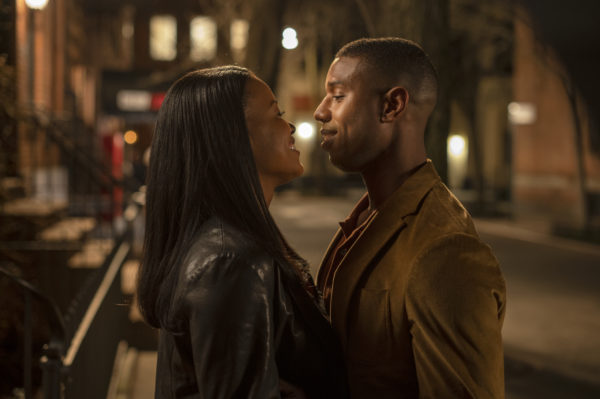
Michael B. Jordan’s star quality was obvious from his first high-profile role, as 15-year-old drug dealer Wallace in the landmark HBO series “The Wire.” Recurring TV roles on “Friday Night Lights” and “Parenthood” followed, but it was his alliance with gifted writer-director Ryan Coogler that propelled him to true stardom. Jordan was compelling in Coogler’s first feature, Fruitvale Station (2013), which followed the last day in the life of Oscar Grant III, a young Black man killed by Bay Area Rapid Transit police in Oakland, California, in 2009. Jordan and Coogler re-teamed two years later on the hit Rocky reboot Creed, with Jordan playing the son of Rocky’s onetime boxing opponent Apollo Creed. The duo then reached the box office stratosphere in 2018 with the Marvel blockbuster Black Panther, in which Jordan’s vengeful Erik Killmonger proved a powerful nemesis for the formidable Chadwick Boseman.
Jordan has continued to do exceptional work in films like Creed II and Just Mercy, and now he’s teamed with one of the giants of modern cinema, Denzel Washington, on Sony’s A Journal for Jordan. Washington directs this true story of First Sergeant Charles Monroe King (Jordan), a soldier stationed in Iraq who keeps a journal of advice for his infant son, Jordan. The film also charts King’s poignant relationship with his wife, New York Times editor Dana Canedy, played by Chanté Adams (Monsters and Men). Virgil Williams adapted the screenplay from Canedy’s book. The Columbia Pictures release debuts in New York and Los Angeles on December 10 and goes wide on December 22.
How did this project come to you?
Denzel and [producer]Todd Black approached me with the story about four or five years ago. I read the script and it really moved me. Afterwards, I started doing my own research on Charles King and Dana Canedy and read the book. It’s always been a dream to work with Denzel, so the fact that he was going to be directing and that we would develop this story together really checked all the boxes for me.
What was it about Charles Monroe King’s story that made you want to portray him?
It being a true story was a huge reason why I wanted to do this. Their story is piece of art, and we all wanted to do a great job in telling it. When you’re portraying somebody, especially in the armed services, you want to make sure you nail it because there’s so many different depictions and stories that tell their story the wrong way. We wanted to make sure that this was not one of them. My dad’s a Marine, and I have a lot of friends and family members that served, so I have a huge respect for the military in general. Whenever I get a chance to throw on that uniform and step into those shoes in front of the camera, I’m making sure that I’m giving 110 percent, because they fight for our freedoms and it’s extremely important to represent them the right way.
What does Denzel Washington’s life and career personally mean to you?
Denzel is the GOAT, a huge mentor to me. He’s on my Mount Rushmore of actors. He has so many great qualities that make him “that guy.” He’s lived the life that people only dream to have. He’s old school and super-wise. He’s funny, more than I think people would expect.
Did you learn anything new about your craft from working with him?
Working with Denzel was a lifetime masterclass lesson on character development, directing, and producing. It was a such an informative process, seeing how he ran his ship and production, and I really grew during this project. I observed and learned as much as I could day in and day out. He’s always got a lot of sayings and little gems, so I really tried to be a sponge and soak it all up along the way.
Denzel has directed himself a few times, and you’re about to have that experience [directing Creed III]. Did he give you any advice about that challenge?
Denzel told me to prep as much as I can, because once you actually start pre-production, time will go by really fast. He gave me a lot of advice on really developing the script to a T, starting to draw up shots as you see it in your head and getting the storyboard artist on early. He compared prepping to grocery shopping, and post is when you’re actually cooking the meal. Everything else is just picking all your ingredients. I like to cook, so I appreciated the analogy.
Tell me about the process of casting Chanté Adams.
We were so lucky to have her. Chanté is such a giving actress and scene partner. She worked really hard on this one. She’s also a great listener. The way she approaches her scenes and her process is top notch. It’s very easy to get into a scene with her and go back and forth.
After the experience of making this film, are you looking to do more romantic roles?
Yeah, it was a really nice change of pace for me. I’ve done a lot of physical roles over the last couple of years, because that’s been my appetite. But I felt safe in being vulnerable in that type of way making this film. Typically, I don’t do romantic roles, but this felt like the right time to do one.
The film is opening exclusively in theaters in December. How important is that to you?
It’s great. I love the movie theater experience. Going to the movies has always been an escape for me. I really feel the audience will love the honest connection with this film—it’s a real love story. People will enjoy the levity, the serious moments, the action, the art.


Share this post